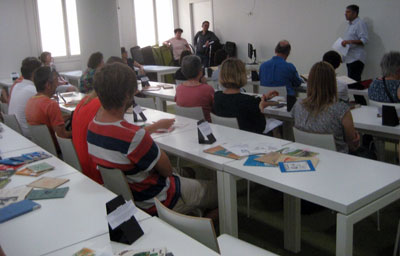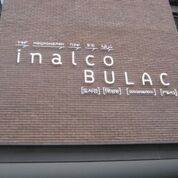9th Conference of European Librarians in African Studies (ELIAS), 7 July 2015, Paris
 On 7 July 2015, the day before the start of the European Conference on African Studies (ECAS), 33 librarians from 8 countries gathered in the Bibliothèque Universitaire des Langues et Civilisations (BULAC) in Paris for the 9th Conference of European Librarians in African Studies (ELIAS). Jos Damen, Elvire Eijkman and Heleen Smits represented the library of the African Studies Centre in Leiden.
On 7 July 2015, the day before the start of the European Conference on African Studies (ECAS), 33 librarians from 8 countries gathered in the Bibliothèque Universitaire des Langues et Civilisations (BULAC) in Paris for the 9th Conference of European Librarians in African Studies (ELIAS). Jos Damen, Elvire Eijkman and Heleen Smits represented the library of the African Studies Centre in Leiden.
A modern Paris library with a strong collection on African languages
BULAC is a modern library that brings together the collections on languages and cultures of the world – except of western Europe – of about eight French universities. A special feature of the library is that it collects publications in all kinds of languages, including African languages, be they spoken by a large number of speakers or by just a few. This makes up for an anything but mainstream collection on African languages: next to grammars and dictionaries, there are novels in Swahili, Hausa and Amharic, but also story books, educational materials and translations of Bible parts in languages that are much lesser known. Part of the books are in open stack, while attractive and informative pamphlets guide the user to the larger language collections. Cataloguing is done in both French and English, and where possible, also in the language of the publication. Another strongpoint of the library is its focus on digitizing (sometimes very old) documents in foreign scripts.
Interesting projects and collections in European libraries
 The conference presentations started with two keynotes, the one, by German PhD student Ninja Steinbach-Huether (Leipzig), on big data analysis of African content in the French national library (Bibliothèque nationale française), the other by Peter Limb of the library of Michigan State University, on collecting African comics and cartoons. The theme of the conference was ‘special collections’. The presentations included a talk on documenting African population censuses and surveys at the Centre Population & Développement-CEPED in Paris; on indexing and digitizing archival materials on Ethiopian Studies at the Frobenius Institute in Frankfurt - with the special goal to make them available for Ethiopian students; and on a collection of old manuscripts in African languages in the Staatsbibliothek zu Berlin. There was also an interesting presentation by Dag Henrichsen of the Basler Afrika Bibliographien on audio letters capturing street sounds of Namibian townships sent home by British missionaries in Namibia.
The conference presentations started with two keynotes, the one, by German PhD student Ninja Steinbach-Huether (Leipzig), on big data analysis of African content in the French national library (Bibliothèque nationale française), the other by Peter Limb of the library of Michigan State University, on collecting African comics and cartoons. The theme of the conference was ‘special collections’. The presentations included a talk on documenting African population censuses and surveys at the Centre Population & Développement-CEPED in Paris; on indexing and digitizing archival materials on Ethiopian Studies at the Frobenius Institute in Frankfurt - with the special goal to make them available for Ethiopian students; and on a collection of old manuscripts in African languages in the Staatsbibliothek zu Berlin. There was also an interesting presentation by Dag Henrichsen of the Basler Afrika Bibliographien on audio letters capturing street sounds of Namibian townships sent home by British missionaries in Namibia.
Library developments
Finally there were some presentations on library developments in the participating countries. They ranged from plans for a big new library in Paris, to activities at the library of the Royal Museum for Central Africa at Tervuren (the museum itself, which is being redone, hopefully opens again in September 2017), and from creative suggestions for getting African photographic, archival and newspaper materials digitized (‘student-driven digitization’) from our Michigan-colleague, to policy changes in Germany regarding the funding of ‘special subject collections’. Apparently the Deutsche Forschungsgemeinschaft (DFG) wants to move away from collection building towards more service provision.
Some days later Peter Limb wrote in his (ALC-ASA-list) report on the ELIAS conference: ‘it strikes me that as collections (either online or print) dwindle, there will be rather little ‘service’ to offer…’.
Heleen Smits

